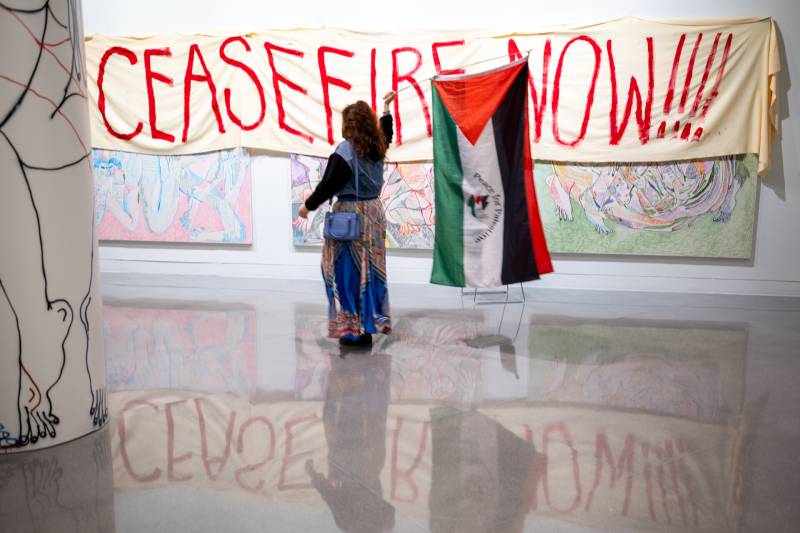In the wake of protests, censorship accusations and calls for a boycott at Yerba Buena Center for the Arts (YBCA), museum interim CEO Sara Fenske Bahat has resigned, the museum’s spokesperson confirmed.
YBCA CEO Resigns After Pro-Palestinian Protest and Boycott

“As a direct result of the events of February 15th and its unending repercussions, I am offering this official notice to immediately resign my position as CEO of YBCA,” Fenske Bahat wrote in a March 3 letter to the art center’s board of directors.
Fenske Bahat’s resignation arrived as San Francisco County Supervisor Hillary Ronen called for a special hearing to look into the publicly funded arts institution, whose galleries have remained closed since an initial Feb. 15 protest three weeks ago.
During the protest, called Love Letter to Gaza, eight participating artists in YBCA’s Bay Area Now 9 exhibition modified their own works with pro-Palestinian messages. The artists organized the protest in collaboration with Jewish Voice for Peace, U.S. Palestinian Community Network and other groups.
“Honestly, we are disappointed to hear that Sara Fenske Bahat has chosen to resign before meeting with us,” Paz G, an artist who co-organized the protest, told KQED. “Our hope was that YBCA, as a public institution, would take this as an opportunity to be in dialogue, learn from and be accountable to the communities that YBCA is supposed to serve. As a collective we firmly believe in transformative justice, and are really sad to hear that resigning and relinquishing all responsibilities was the CEO’s only response.”
Public support of the artists has grown since the Feb. 15 protest. On Feb. 27, a group of YBCA staff published an open letter in support of the artists, which has since been signed by nearly 600 people, including high-profile figures like Emory Douglas and San Francisco Poet Laureate Tongo Eisen-Martin.
“Given [that YBCA is] supposed to be a public institution that has nonprofit status, I believe its responsibility is to allow these conversations to happen without interfering as much as they have been,” said artist My-Linh Le, a YBCA 10 fellow who signed the letter.
At the March 5 Board of Supervisors meeting, Ronen referred to YBCA’s actions as censorship. “Instead of making room for perspectives of these artists, YBCA, which promoted the exhibit as showcasing diverse voices, responded alarmingly by shutting down the exhibit,” Ronen said. “These actions translate into no field trips for our high school students and canceled film, dance and art performances for the public at large. It is also concerning to me that all the censored artists are people of color.”
Sheila Chung Hagen, Ronen’s legislative aide, told KQED that the hearing will likely take place in early April.
Abby Margulies, YBCA’s publicist, told KQED that an interim CEO has not been named, and it is still unknown when the museum will reopen. She said museum leadership still plans to meet with the Love Letter to Gaza artists.
In response to Fenske Bahat’s resignation, YBCA’s board of directors published a statement that condemned the Feb. 15 protest, and specifically the artists’ call to “remove Zionist board members and funders.”
“That is not art. That isn’t protest. That is simply wrong and unacceptable,” the letter reads.
A previous statement from YBCA leadership charged the artists with ethnic and religious discrimination, which protest organizers denied.
“This is a tactic that is being used against people fighting for a ceasefire and to end the genocide in Palestine. … We’re being essentially painted as anti-Semitic,” artist Paz G said in a previous interview with KQED, adding that Zionism is a political ideology and not a religion or ethnicity.
In her resignation letter, Fenske Bahat predicted that protesters “will claim victory over my leaving.”
“The vitriolic and anti-Semitic backlash directed at me personally since that night nearly three weeks ago has made being here intolerable,” she wrote. “I no longer feel safe in our own space, including due to the actions of some of our own employees.”
On March 14 at 5:30 p.m., the Love Letter to Gaza artists plan a public program outside of YBCA, where they will screen print protest posters. They have reached out to the museum’s board for a meeting, and are calling for YBCA to reopen the Bay Area Now 9 exhibition with the altered artworks intact.

This is a developing story.

